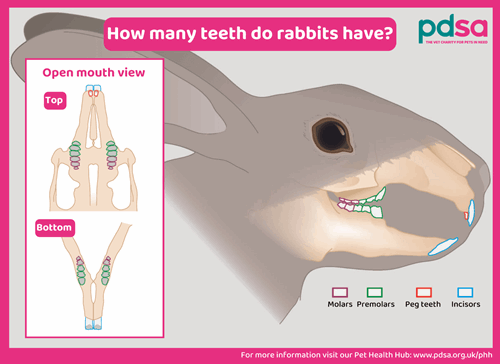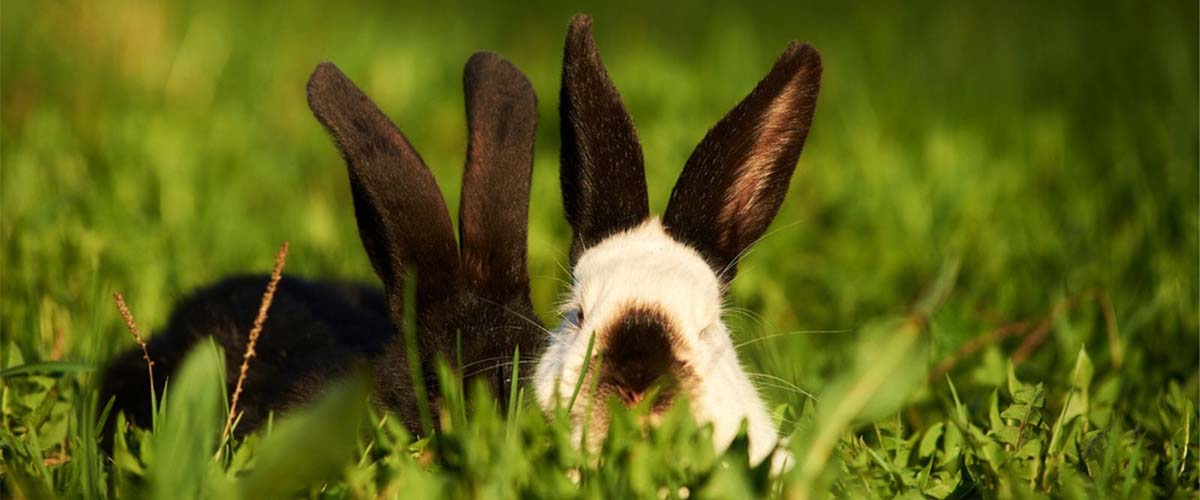Dental problems in rabbits
Overview
- Dental problems are common in pet rabbits and are usually caused by a diet that’s too low in fibre.
- Common problems include overgrown teeth, spurs, tooth root abscesses, and broken teeth.
- Rabbits tend to hide pain, so unfortunately dental disease often goes unnoticed until it’s severe – for this reason, it’s important to regularly check your rabbit’s teeth at home, and have them examined by your vet a few times a year.
- The best way to prevent dental problems is to feed your rabbits a well-balanced diet, high in fibre.
Symptoms
Symptoms of dental disease in rabbits include:
- Overgrown teeth
- Weight loss
- A dirty bottom – because grooming becomes difficult and painful
- Diarrhoea or soft faeces
- Weepy eyes
- Drooling
- Reduced appetite
- Tooth grinding
- A bumpy, painful jaw
- A runny nose
- Lethargy (low energy)
Overgrown front teeth
- Your rabbit’s front teeth (incisors) are for picking up and cutting food.
- If they become overgrown your rabbit will have problems eating, drinking, grooming, and closing their mouth.
- If your rabbit’s front teeth are overgrown, it’s very likely their back teeth are as well.

Overgrown back teeth
- Your rabbit’s back teeth (molars) are for grinding food.
- When they overgrow they develop sharp edges called spurs. Spurs dig into the cheeks and tongue, causing painful sores.

Tooth root abscesses
- A tooth root abscess is a painful infection around a tooth root where it sits in the jaw.
- The earlier a tooth root abscess is treated the better the chance of recovery. Unfortunately they can be extremely difficult to treat and often require a long course of treatment, and sometimes surgery.
- Unfortunately, many tooth root abscesses never fully resolve.

Tooth injuries
- If your rabbit breaks a tooth while fighting or gnawing on something hard, it may need to be removed.
- Overgrown and unhealthy teeth are much more likely to break and get damaged.
Treatment
The exact treatment your rabbit needs will depend on what is wrong, but often involves:
Tooth trimming – If your rabbit’s teeth are overgrown, or have spurs (spikes that stick into their gums or tongue), they will need to have them trimmed under anaesthetic. Never attempt to treat or trim your rabbit’s teeth at home - you could crack a root, which will cause severe pain and long-term problems.
Tooth removal – if any of your rabbit’s teeth are damaged or growing at the wrong angle they may need to be removed. Similarly, if they have any tooth root abscesses they may need some teeth removed. Tooth removal in a rabbit is complex surgery because they have small mouths, long tooth roots, and delicate jaw bones.
Medication – Dental problems are very painful so usually require pain relief. Antibiotics may also be necessary if your rabbit also has a tooth root abscess or an infection inside their mouth.
Syringe feeding – If your rabbit is struggling to eat, you may need to syringe feed them for a short while.
Grooming – If your rabbit’s dental problems are causing them to drool more than usual you will need to keep their chin dry to prevent them from developing sores. If they are struggling to clean themselves you will also need to groom them and keep their bottom clean.
Preventing dental disease in rabbits
Feed a well-balanced diet
- One of the best ways to prevent dental disease in rabbits is to feed them a diet very high in fibre (grass and hay).
- Check out our feeding guide for more information.
Check your rabbit’s teeth regularly
- Check your rabbit’s teeth at home, at least once a week.
- Ideally, also have them checked by your vet a few times a year but, if this isn’t possible, once a year as a minimum.
- For more information, check out our page on how to check your rabbit’s teeth.
Cost
Treating a rabbit with dental problems can become very expensive because it tends to be an ongoing problem that requires lifelong treatment and check-ups. Always speak to your vet if you can’t afford the treatment they have recommended because there may be other options.
We strongly recommend taking out insurance for your rabbits as soon as you get them, before any problems develop. Always check if your insurance policy covers dental disease.
How many teeth do rabbits have?

Rabbits have 28 teeth
16 top teeth:
-
- Four incisors (front teeth) –you will only be able to see the front two because the others, called ‘peg teeth’ are very small and are hidden behind the front two.
- Three premolars (middle teeth)
- Three molars (back teeth)
12 bottom teeth:
-
- Two incisors (front teeth)
- Two premolars (middle teeth)
- Three molars (back teeth)
How to trim rabbit teeth
Never attempt to trim your rabbit’s teeth yourself, you are likely to fracture them, or unknowingly cut them too short and expose the nerve inside, both of which will be extremely painful and mean the tooth will need to be removed. Your vet will use a special instrument to trim your rabbit’s teeth in a careful and controlled environment, usually under anaesthetic.
Published: February 2023
Did you find this page useful?
Tell us more
Please note, our vets and nurses are unable to respond to questions via this form. If you are concerned about your pet’s health, please contact your vet directly.
Thank you for your feedback
Want to hear more about PDSA and get pet care tips from our vet experts?
Sign up to our e-newsletter
Written by vets and vet nurses. This advice is for UK pets only. Illustrations by Samantha Elmhurst.

 Video found at youtu.be/ewHkrdaTww4
Video found at youtu.be/ewHkrdaTww4
